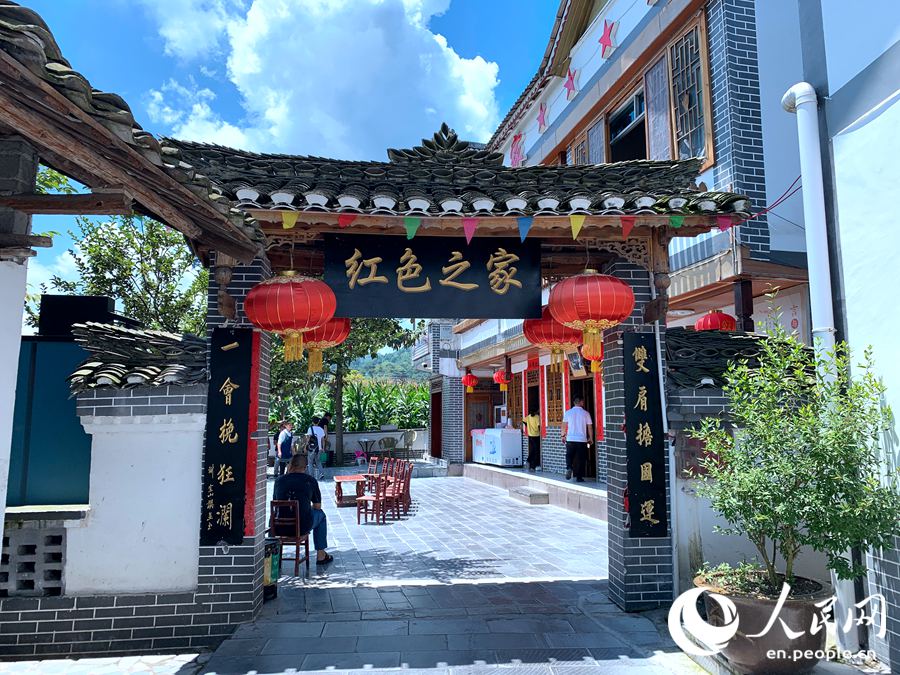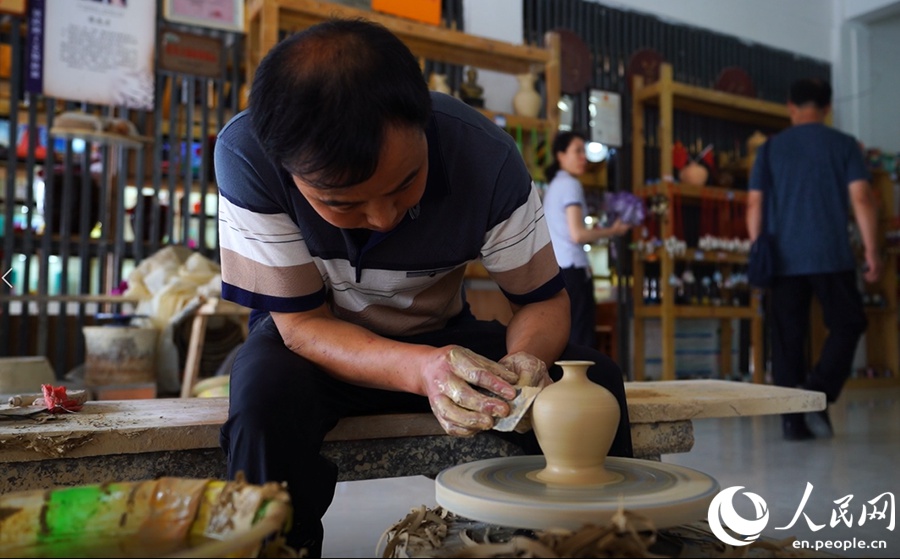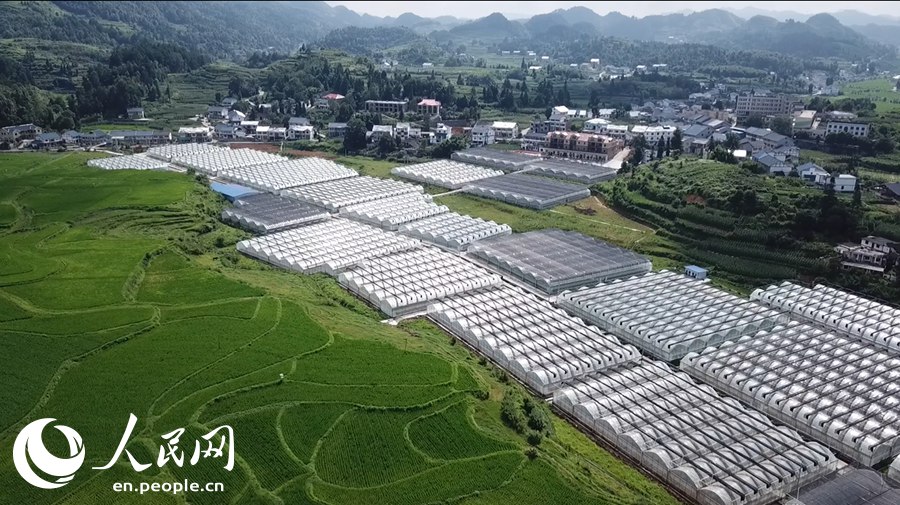

Lush vegetation, green mountains, flowing rivers, neat houses and tidy streets line up in a picturesque manner, just like an oil painting. Here, at Huamao Village, Chinese President Xi Jinping found nostalgia.
Huamao Village, located in Zunyi City, Southwest China's Guizhou Province, is titled with "the most beautiful Red Village in China". Formerly known as "Huangmao Tian," which literally means a desolate and barren place, Huamao used to be a poverty-stricken village with difficulties in developing agriculture and retaining young villagers.

Huamao Village in the morning. (Photo by Tu Min)
However, with tireless efforts from the local government and villagers to develop rural tourism and modern agriculture, the overall level of Huamao's population to rise above the poverty line has reached 98 percent. By the end of 2018, the village had 42 country hotels, with more than 400 people from 80 households engaged in the village's tourism industry including restaurants, shops and inns. Last year, the village received 1.8 million tourists and gained a total income of over 650 million yuan from rural tourism.
Follow the path of the Red Army
To talk about Huamao's development path of rural tourism, one could not skip mentioning the historical significance of the Long March; a military maneuver carried out by the Chinese Workers’ and Peasants’ Red Army Red Army from 1934 to 1936.
In January 1935, a meeting was held by the Political Bureau of the Communist Party of China (CPC) Central Committee in Zunyi during the Long March. The Zunyi Meeting established the leadership of the new Central Committee, as represented by Mao Zedong. This is regarded as a crucial turning point of the Long March, leading to the ultimate success of the Chinese revolution.
Since then, Zunyi has become a sacred place for generations of CPC members, and the footprints of the Red Army are also forever imprinted on Huamao's culture and spirit.

Entrance of the "Red Home" farm-stay. (Photo by Zhao Tong)
"The Red Army soldiers stayed in my quadrangle dwellings during the Long March in 1935. So, I named my farm stay 'Red Home,'" said Wang Zhiqiang with pride.
58-year-old Wang is the owner of a farm stay with a sense of history, themed around the Party. Nowadays, a large number of tourists from around home and abroad visit his farm stay every year to follow the historical path of the Red Army.
Wang returned home to start his farm stay business in Huamao Village in 2012 with the money he saved over 34 years. He said what drove him back home was nostalgia – the unwillingness to separate from his hometown for too long. It's like "fallen leaves returning to their roots," he said.
Wang was the first person in Huamao Village to change his quadrangle dwellings into a farm stay integrating catering, residence and entertainment, which now earns him an annual income of around 900,000 yuan. His success has inspired many of his fellow villagers to start their own farm stay businesses.
President Xi Jinping, General Secretary of the Communist Party of China (CPC), went to Wang Zhiqiang's home in June 2015 while inspecting Huamao Village.
Wang said he's still very excited about the life-changing moment when he met President Xi in June 2015. In Wang's farm, President Xi said, "Whether the Party's policy is good or not depends on whether it makes the people smile or cry."
"We all smiled, because we think the policy is great for putting the villagers on a better path of development," said Wang.
Traditional craftsmanship lives on
Huamao village's pottery workshop is another famous place worth a visit, a place honoring the craftsmanship that has lived on in Huamao for 140 years.
The owner, 51-year-old Mu Xiancai, has been making pottery since he was 13 years old. His family has passed on the skill for four generations, which is now a local intangible cultural heritage. Back in the 1960s, in its heyday, Huamao potters made and supplied jars to the Kweichow Moutai factory, one of China's leading liquor brands.

Mu Xiancai makes the pottery in his workshop in Huamao Village. (Photo by Tu Min)
In the 1990s, potters were in decline due to the development of machinery alternatives to manufacture liquor vessels. Mu experienced the ups and downs of the industry, yet he never gave up. Many villagers quit, he didn't.
Persistence paid off. Things started to change after Huamao Village began to develop rural tourism in 2014. More and more tourists have come to Mu's pottery workshop to purchase pieces or have fun making ceramics with their own hands.
During the tour of Huamao Village in 2015, President Xi told Mu to pass on the craft no matter what.
Now his annual income has increased from 30,000 yuan to 360,000 yuan.
"I will never forget his words," Mu said.
Modern agriculture grants villagers stable income and momentum
Huamao Village, with a boom in rural tourism and a spirit of traditional craftsmanship, couldn't prosper without agricultural development as its foundation.
The village has thus established a rural cooperative that has turned its smaller agricultural businesses into a collective industry.

Aerial photo of vegetable greenhouses in Huamao Village. (Photo by Tu Min)
The cooperative covers an area of 350 mu of land, which is mainly used to plant crops with high yield and output value, such as tomatoes, gourd, cucumbers, cowpeas, chives and peppers.
According to He Wanming, director of the cooperative, one of the main goals of the cooperative is to help lift villagers out of poverty.
"Grassroots officials need to suit their measures to each individual when it comes to helping local villagers solve real problems," He said.
At least 142,000 yuan from the cooperative's annual profit is allocated as a bonus to 142 targeted poverty alleviation households. Moreover, the cooperative hires eight families as employees, granting them a yearly salary of 30,000 yuan per person. Last but not least, 30 percent of the cooperative's profit is used as the village's poverty alleviation fund to improve the livelihoods of villagers with such things as medical treatment as well as allowances to households in need.
"The work of poverty alleviation is a solemn promise our country has made to the world," He said, adding, "it's a promise that every grassroots official like me and every member of the society need to be working tirelessly to fulfill."

 Award-winning photos show poverty reduction achievements in NE China's Jilin province
Award-winning photos show poverty reduction achievements in NE China's Jilin province People dance to greet advent of New Year in Ameiqituo Town, Guizhou
People dance to greet advent of New Year in Ameiqituo Town, Guizhou Fire brigade in Shanghai holds group wedding
Fire brigade in Shanghai holds group wedding Tourists enjoy ice sculptures in Datan Town, north China
Tourists enjoy ice sculptures in Datan Town, north China Sunset scenery of Dayan Pagoda in Xi'an
Sunset scenery of Dayan Pagoda in Xi'an Tourists have fun at scenic spot in Nanlong Town, NW China
Tourists have fun at scenic spot in Nanlong Town, NW China Harbin attracts tourists by making best use of ice in winter
Harbin attracts tourists by making best use of ice in winter In pics: FIS Alpine Ski Women's World Cup Slalom
In pics: FIS Alpine Ski Women's World Cup Slalom Black-necked cranes rest at reservoir in Lhunzhub County, Lhasa
Black-necked cranes rest at reservoir in Lhunzhub County, Lhasa China's FAST telescope will be available to foreign scientists in April
China's FAST telescope will be available to foreign scientists in April